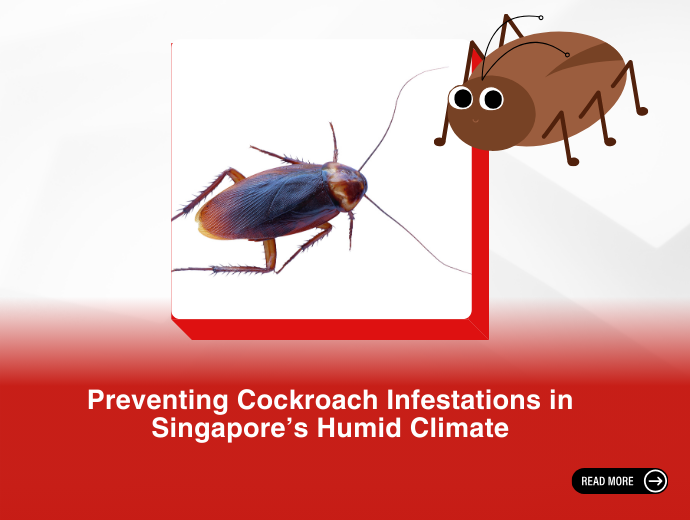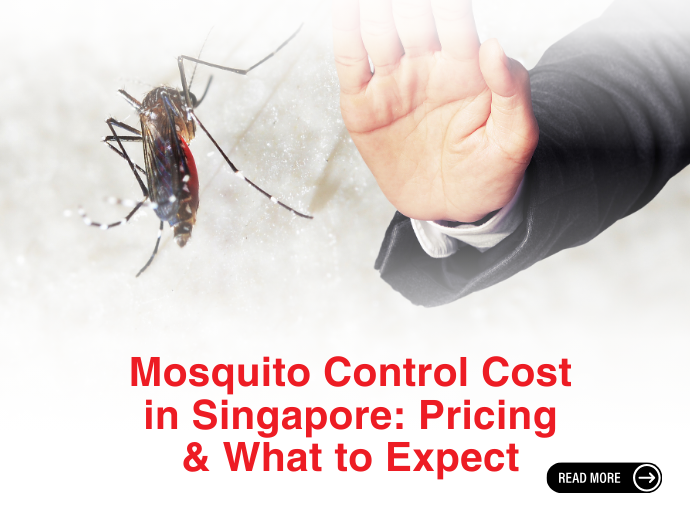Introduction
Rodent control in Singapore is an uphill task! While the hot and humid environment encourages rat infestation here, the urban green areas and plentiful hiding avenues make the situation even worse! Moving beyond their notorious reputation of plaguing human dwellings, these pesky pests are becoming a severe issue for commercial spaces. Yes, from restaurants, food centres, and shopping malls to Singapore's Bird Paradise (aviary), rat infestations have become rampant!
Their ability to flourish in every environment makes rodent control challenging for Singaporean businesses. We at ORIGIN Exterminators understand that apart from being a public health concern, curbing rat infestation is crucial for maintaining customer trust and operational efficiency. Therefore, through this blog, we will explore expert strategies for preventing and managing these pests. We will also highlight ORIGIN’s numero-uno RATSENSE technology that can help businesses of all nature successfully eradicate these pests.
Challenges of rodent control in Singaporean businesses
Singapore’s hot and humid climate coupled with abundant food and shelter options provides favourable environment for rat infestations to go unchecked for a long. The commercial and industrial areas provide ideal habitats for common rodents in Singapore like roof rats (Rattus rattus), house mice (Mus musculus), and Norway rats (Rattus norvegicus). Businesses like warehouses, restaurants, food processing units, and retail outlets are rat hubs as they largely attract these pests.
Rodent control in business premises is essential as rats can inflict three major types of damage: structural, health, and financial.
Structural Damage:
Their constantly growing sharp incisors make them chew on something all the time. These pests can literally gnaw anything on your business premises like electrical wires, structural materials, wall plaster, or wooden furniture. They tend to burrow to nest and breed within upholstered furniture and walls causing substantial damage to the structure. Moreover, their chewing through wires increases the short-circuit risk!
Health Damage:
Rats carry a host of pathogens (disease-causing organisms), such as hantavirus, leptospirosis, rat bite fever, salmonella, and typhus. As rodents rummage through premises, their skin, hair, saliva, urine, and droppings contaminate the entire area. This is specifically concerning for food retail, malls, and hospitality industries.
Financial Damage:
Rat infestation in food establishments and high-dependency industries leads to severe financial implications. First, businesses resort to expensive pest control services to handle the issue. Second, they invest in renovating the buildings to fix the damage done by rodents. Lastly, they suffer consequences like negative brand image, operation disruption, reimbursement, product recall, and, in many cases, closure of business!
Effective rodent control strategies for businesses in Singapore
In Singapore, every business is expected to comply with the pest control regulations enforced by the National Environmental Agency (NEA). NEA has listed a comprehensive guideline for monitoring, prevention, and eradication strategies for effective rodent control, especially for food establishments. However, at ORIGIN we know that a multi-faceted approach is required to check the rat infestation in our country. Below are some expert strategies every business in Singapore must implement:
1. Inspection and Risk Assessment:
The primary step in any pest control plan is inspecting the premises and gauging the risks associated with the type of infestation. For an effective rodent control strategy, seek help from pest control professionals. They help in spotting nesting areas, potential entry points, and water and food sources that are attracting them. They can provide key insights into risk assessment by determining the types of rodents present on the premises and the level of infestation.
Key areas to inspect include:
- Entry and exit points: Rodents can make their way through the smallest cracks and gaps. So, inspect for holes or gaps in walls, doors, and windows.
- Food availability: Improperly stored food items and plenty of edible debris attract rats and mice in businesses like malls, restaurants, and storage facilities. Ensure your premises are regularly cleaned and maintained and that food is packed in airtight containers.
- Nesting sites: Rats harbour in secluded areas. Look for them in storage rooms, on the ceilings, behind the walls, and under machinery.
2. Eliminating Access Points:
Rodents thrive on spaces that fulfil their food, water, and shelter requirements. If you successfully eliminate these access points from your business, your premise will become less attractive to them.
To prevent the easy access, businesses should:
- Cover ventilation systems: Cover all air vents and ducts to keep rodents from entering through these systems.
- Seal gaps and cracks: Use rodent-proof materials to protect the structure of your property. Use caulk or steel wool to seal cracks and gaps around pipes, doors, or vents. Check if the doors do not seal tightly when closed and keep the window screens intact.
- Install door sweeps: Door sweeps are important accessories for kitchens, warehouses, or food-related businesses. Doors with proper sweeps prevent rodents from entering the facility.
3. Proper Waste Management:
Exposed left-over food waste can be a major attractant for rodents. These opportunistic feeders flourish in the businesses with improper waste management practices.
Tips for proper waste management:
- Store waste properly: Use secure containers or bins with lids that rodents cannot access. Keep these bins sealed and tightly packed to minimise odours that can otherwise invite rats.
- Regularly dispose of trash: Stop leaving food waste in dumpsters or in the open for extended periods. Dispose of them regularly to prevent rats from scavenging through the food scraps.
- Maintain cleanliness: Food-related businesses must clean and sanitise the food preparation areas thoroughly. All oil and other material residues must be swept meticulously.
4. Rodent Traps and Bait Stations
Businesses that install traps and bait stations as precautionary measures stay safe from rat infestations. While traps help in eliminating rodents by catching them bait stations lure to poison them! These methods need to be strategically and safely carried out by pest control experts to avoid any harm or risk to non-targeted animals and children.
Types of rodent control devices:
- Bait stations: These with poison attract rodents. These are typically tamper-proof stations to keep other pets and children safe. However, safety measures must be considered to avoid accidental ingestion of the toxic bait by non-targeted species.
- Snap traps: Snap traps ensure quick kill to eliminate rodents. They are positioned in areas with frequent rodent activity and can be used with rodent attractants like cheese or peanut butter. ORIGIN’s T-REX Snap Trap is a highly effective trap that ensures a humane kill.
- Live traps: These capture the rodents without killing or harming them. Once the rat gets trapped, they can be relocated far from the business premises..
- Glue boards: ORIGIN’s sticky and scented glue boards attract and trap rodents.
As rodents are smart, they adapt their behaviour. One type of control approach may work initially but not over time. There needs to be a detailed surveillance programme and the continuous use of different control techniques as mentioned above that keeps assessing the effectiveness of control methods used.
5. Professional Pest Control Services
Many businesses can keep rats away by implementing rodent control strategies. However, once the rat infestation intensifies, professional pest control services become necessary.
Expert services offer:
- Expertise: Professional exterminators have the skill, knowledge, and experience to handle all kinds of rat infestation. They can implement tailored solutions depending on the requirements of your business.
- Integrated Pest Management (IPM): IPM is a holistic, eco-friendly, and sustainable approach to controlling pests in the long term. With minimal chemical pesticides, IPM focuses on monitoring and preventing methods to deter pests. The idea is to resort to mechanical and biological methods to stay environmentally responsible.
- Comprehensive pest management: Once you opt for a professional pest company, you can avail yourself of their comprehensive packages. They will ensure rodent control and address other pest problems, ensuring safe and hygienic premises.
ORIGIN’s RATSENSE: An effective rodent control strategy for Singaporean businesses
RATSENSE surveillance system uses IOT for monitoring and controlling rat infestation. The feature of real-time rodent activity can keep businesses informed of infestation levels. Furthermore, ORIGIN can use data to generate reports and provide actionable insights for successful rodent control on the premises.
Three key highlights of RATSENSE:
- The system tracks the rodent activity 24/7, so detection with data is always on, allowing for detection before a rodent infestation can be established
- It is a low-cost, self-controlled, self-sustaining yet effective solution. There is no need for any battery changes ( less operational disruptions) and no need for any wiring or cabling work.
- RATSENSE creates visibility and transparency to you on the situation - avoiding those nasty surprises!
Conclusion
Eliminating rat infestation from any business is an ongoing process. Businesses from the food industry especially need to be more vigilant in monitoring and implementing preventative measures for better rodent control as it will protect your product, property, and reputation. With the right strategies, businesses cannot only safeguard their premise but focus on the health and safety of their customers and employees.
With ORIGIN’s RATSENSE businesses can protect themselves from the hazards of rat infestation and focus on offering a safe and clean environment to patrons and delivering excellent services without any interruption.
.png)

.png)
